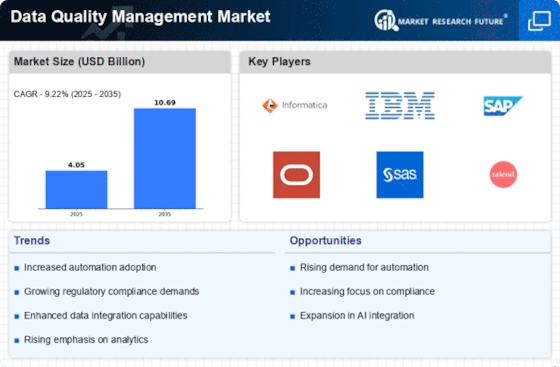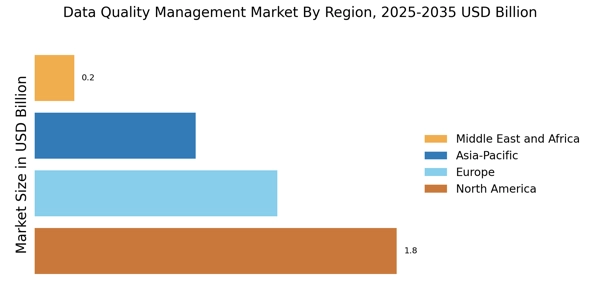Increasing Data Volume
The exponential growth of data generated by organizations is a primary driver for the Data Quality Management Market. As businesses increasingly rely on data for decision-making, the need for accurate and reliable data becomes paramount. According to recent estimates, the total amount of data created globally is expected to reach 175 zettabytes by 2025. This surge in data volume necessitates robust data quality management solutions to ensure that organizations can derive meaningful insights from their data. Consequently, companies are investing in data quality tools and technologies to maintain data integrity, which is likely to propel the Data Quality Management Market forward.
Integration of Data Sources
The integration of diverse data sources is a significant driver for the Data Quality Management Market. Organizations are increasingly consolidating data from various platforms, including cloud services, on-premises systems, and third-party applications. This integration presents challenges related to data consistency and accuracy. To address these challenges, businesses are investing in data quality management solutions that facilitate seamless data integration while ensuring data integrity. The need for effective data quality management in the context of data integration is expected to propel the growth of the Data Quality Management Market, as organizations seek to create a unified view of their data.
Adoption of Advanced Analytics
The growing adoption of advanced analytics and business intelligence tools is driving the Data Quality Management Market. Organizations are increasingly leveraging data analytics to gain insights and make informed decisions. However, the effectiveness of these analytics is contingent upon the quality of the underlying data. As businesses strive to harness the power of data analytics, they are recognizing the importance of data quality management in ensuring accurate and actionable insights. This trend is likely to lead to increased investments in data quality management solutions, as organizations seek to enhance their analytical capabilities and drive better business outcomes within the Data Quality Management Market.
Emphasis on Customer Experience
In today's competitive landscape, organizations are placing a heightened emphasis on customer experience, which significantly influences the Data Quality Management Market. Companies recognize that high-quality data is essential for understanding customer preferences and behaviors. As a result, businesses are increasingly adopting data quality management practices to enhance customer interactions and satisfaction. Research indicates that organizations with effective data quality management strategies can improve customer retention rates by up to 20%. This focus on customer-centricity drives investments in data quality solutions, thereby fostering growth within the Data Quality Management Market.
Regulatory Compliance Requirements
The evolving landscape of regulatory compliance is a critical driver for the Data Quality Management Market. Organizations are facing stringent regulations regarding data privacy and protection, such as the General Data Protection Regulation (GDPR) and the California Consumer Privacy Act (CCPA). Compliance with these regulations necessitates accurate and reliable data management practices. Companies are compelled to invest in data quality management solutions to ensure adherence to these regulations, thereby mitigating risks associated with non-compliance. The increasing focus on regulatory compliance is expected to significantly boost the demand for data quality management tools and services within the Data Quality Management Market.

















